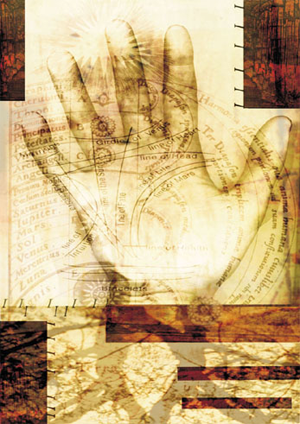|
The lines of providence
registered on my forehead
neatly concealing Prarabdha
the store house of desires
- Iccha, Aniccha, Parichha -
the very cause of my birth
 an inheritance an inheritance
bequeathed
so that
I may read, think, reason
assimilate, discriminate
make choices
and form the roots
that nurture the lines
etched
on my karmic palms.
I, thus, am the playwright
of the drama of my life
impregnated with
logic, strategy and abundant faith
in spite of the tumult of doubts
giving birth to
the line of fate.
Whatever is …
it’s my own doing.
That's why
on a chosen path
the lines on the soles
keep treading and digging
the labyrinth of life
- Maya -
in quest of Nirvana.
|
|
Comments on this Poem

|
Indeed, a thought-elevating poem.
|
|

|
Indeed, a thought-provoking poem.
|
|

|
>Also, those of Indians who have a flair for writing poetry will go ahead with their creations, some faults notwithstanding in the British eyes. This metamorphosis is inevitable in any foreseeable future and may end in the English world becoming tuned to such blemishes eventually.<
What is more important, surely, is that poetry currently written by Indians in English has an appreciative audience; as indeed, I pointed out in an earlier comment on Raj's poetry, it clearly does. This whole poetry site is based on such an appreciation.
'Faults... in British eyes', for example, definite article misusage, remain perceived as faults within one context; but perhaps are reconciled in another context as usage. This 'context of language usage' approach to modern English gives validity to many breaches of so-called prescriptive usage.of English even within the 'English world'.
|
|

|
21 October 2012
TO: Mr. Rajender Krishan
Your following lines again provoke me to quote Tagore for which I should be excused-
"on a chosen path
the lines on the soles
keep treading and digging
the labyrinth of life
- Maya -
in quest of Nirvana".
On the Maya doctrine, I would quote from Tagore's "Shesh Lekha" (=Last writing) [I'll shortly submit its full text for Boloji's consideration.]
" Love’s treasure in Universe immense
Will forfeit it in totality thence,
Such a pirate omnipotent,
In Creation’s nook and corner is non-existent.
The utmost truth I perceive,
Latent therein the utmost falsity to deceive;
For Existence, this extreme ignominy
I’m sure, tunes not with Creator’s harmony."
So, Tagore's conviction was that life is not an "illusion" if implication of "Maya" is precisely that.
I also beg to be excused for my English while it shares all the deficiency of the English penned by the Indians nay, the whole of non-English community, as Mr. R. D. Ashby has eminently pointed out. To minimize (or to unwittingly aggravate?) this deficiency I resort to "Rhyming" (by hook or by crook) in case of poetry believing in Tagore's observation - "Just as the two banks of a river make its flow spontaneous, so does rhyming for aesthetics". Of course, Tagore wrote wonderful blank verses also but that is a different matter for a great talent like him.
The basic problem is, Bengali is poles apart from English in its style of communication. But that did not daunt the translators from communicating the best in Bengali literature to the English world, while English is the lingua franca of the world for historic reasons. Also, those of Indians who have a flair for writing poetry will go ahead with their creations, some faults notwithstanding in the British eyes. This metamorphosis is inevitable in any foreseeable future and may end in the English world becoming tuned to such blemishes eventually.
Rajat Das Gupta
|
|

|
If I may politely comment, Raj, on the form of your poetry, inclusive of all your poems, and typically, that of all Indians writing in English, it is that it depends on the way ideas are set out, using words purely as ciphers of, as much as it can be said they achieve this, literal meaning. Let me clarify that they lack a dimension of the sound of the English language, so necessary for driving meaning home that a poet whose mother tongue is English might achieve.
I once commented to this effect regarding translations into English of Tagore's poems by a Bengali scholar: that the musicality of the native Bengali language is rendered void in what is still remarkably well-expressed in terms of literal meaning, One has only to start to sing the Indian National Anthem, words and music by Tagore:
Jana-ga?a-mana adhin?yaka jaya he
Bh?rata bh?gya vidh?t?
to realise the spell-binding rhythm of language conveying the emotion that Tagore's own English translation would, though conveying the same literal meaning, be void of:
Thou art the ruler of the minds of all people,
Dispenser of India's destiny.
In the interests of brevity, I will merely conclude that Tagore the master illustrates the syndrome in all Indian, extend that to all foreign poets writing in English.
|
|

|
WONDERFUL...LET THE ENLIGHTENMENT SPREAD UBIQUITOUSLY...
|
|

|
Profundity at its poetic best.
|
|

|
A true inquiry.
|
|

|
Metaphysics!
|
|

|
This is a great poem-it seems you are sitting on a Hover Craft, skimming over the sea of spirituality.
|
|

|
Muse-blessed Rajenderji composes the most profound poems.
|
|

|
Absolutely divinely, wonderful. can read it over and over again. So deeply philosophical...
Rajendra ji, more power to your pen.
Julia
|
|

|
A wonderful philosophical poem with a poetic profundity...
|
|
|